| Introduction |
Welcome to a rather thick issue of the Podcaster. We have a lot of news! The first item highlights a workshop held in Wageningen in late August to develop the detailed plans for Monitoring and Evaluation within N2Africa as well as the Master Plans for project activities. Considerable effort is being put into standardization of data collection and establishment of a database structure that will make all of our data openly accessible to all partners within N2Africa, and soon to everybody. Part of these activities involves the use of tablets for data collection that proved to provide some fun for workshop participants. ...
|
1 |
| N2Africa Leadership Team & Country Coordinators gathered at WUR for Monitoring and Evaluation Workshop, 18-22 August 2014 |
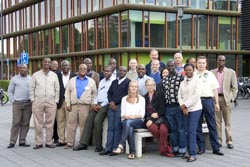 |
During the 3rd week of August, N2Africa project leadership team, core country coordinators and selected partners gathered for Monitoring and Evaluation (M&E) workshop and finalization of other Master Plans of the project. ...
|
|
2 |
| Exploring the use of tablets for data collection in N2Africa |
|
N2Africa generates large volumes of agronomic and survey data. Timely analysis of this data is essential to ensure that on-going activities are properly informed by past findings. This places high demands on both the quality of data and on the speed with which it can be processed. For this reason, we have started to explore the use of tablet devices for data collection in the field. ...
Photo: During the recent Monitoring and Evaluation meeting held in Wageningen, country coordinators had the opportunity to get their first hands-on experience with the use a tablet device.
|
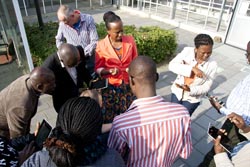 |
|
3 |
| Update of N2Africa project activities in Ghana |
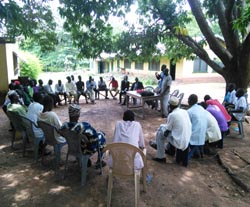 |
This season N2Africa together with its disseminating partners is disseminating legume technologies to over 6000 farmers cultivating cowpea, groundnut and soyabean in seven districts in northern Ghana. N2Africa currently works with about ten partner organizations in Northern Ghana. ...
Photo: Farmer feedback meeting held at one of the N2Africa sites
|
|
4 |
| Update from Nigeria |
|
About Community mobilization:
N2Africa-Nigeria is conducting an awareness campaign to inform the rural farming communities on yield enhancing technologies ...
And Pre - season training in Nigeria:
Prior to planting date the project organized pre–season training for participating farmers...
|

Pre-season training in Kaduna State
|
|
5 |
| IITA Youth Agripreneurs and N2Africa flag off 3-week intensive training for Borno State youths (#SBYOUHT2014) |
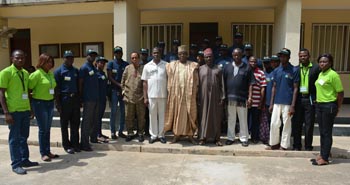 |
IITA Youth Agripreneurs in collaboration with N2Africa on the 3rd of September, 2014 flagged off the 3-week intensive training for 20 youths from Borno State proposed few months ago, which seeks to build the capacity of the youths in agribusiness as an income generating activity.
The 3-week intensive training according to the IITA Youth Agripreneurs ...
|
|
6 |
| N2Africa-Ethiopia, update on the season’s activities |
|
In this cropping season, N2Africa-Ethiopia has planned to reach more than 5000 farmers in 24 Woredas (districts) through its research and development partners (Federal and Regional Agricultural Research Institutes and Hawassa University). The Woredas have been identified as potential pulse growing areas earlier and located at four regions in Ethiopia (Amhara, Benishangul-Gumuz, Oromia and Southern Region). ...
Photo: Active participation of women farmers in the field evaluation of faba bean trials at Dabat woreda
|
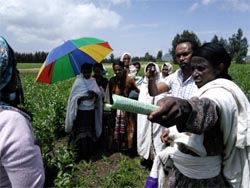 |
|
7 |
| Uganda Progress |
|
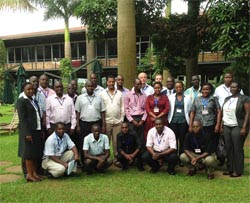
|
Progress has been made in implementing the N2Africa project since its launch early this year and I am hereby pleased to briefly share the progress per objective: Objective 1. M&E and capacity building and Objective 2. Dissemination, delivery, input and output market
Photo: Participants at the National partners meeting held at Kabira country club, 19-20th June 2014
|
|
8 |
| Smallholder farmer’s brace for improved productivity of groundnut and market access in Uganda |
|
Smallholder farmers have started embracing knowledge gained from the N2Africa project to improve groundnut production in Minakulu, Oyam district, Northern Uganda. World Vision Uganda engaged with 60 smallholder farmers ...
Photo: World Vision’s Farmer field school facilitator (bending) examining groundnut pegging on one the on-farm demonstration trials in Minakulu Variety demonstrations
|
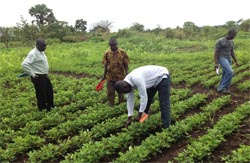
|
|
9 |
| N2Africa and AfricaRice working to diversify and intensify the rice-based cropping systems of Kilombero valley in Tanzania |
|
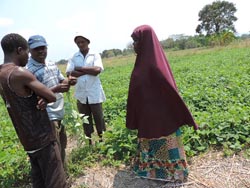
|
Kilombero Valley, located in south-central Tanzania, is a major rice production area with smallholder rice schemes occupying about 2,080 square kilometers. Rice production is largely based on rain-fed lowland cropping systems, where rice is grown over the wet season, and field left fallow over the dry season. Demographic growth and increased demand for land ...
Photo: A well performing demonstration on cowpea GAPs at Idete wardin Kilombero district.
|
|
10 |
| N2Africa DRC forms more partnerships and continues Rhizobiology activities |
|
On 29th July 2014, the N2Africa DRC team attended a workshop to plan activities for the Mega Program Humid Tropics. Many organizations and their partners joined this meeting to familiarize themselves with the activities undertaken by every program or project, to detect the complementarities between these projects/programs and to identify the gaps to be covered for the East of DR Congo.
On 30th July 2014, the N2Africa DRC team and the direction team of Women for Women (WfWi) met at IITA’s Kalambo station (photo).
|
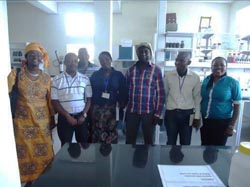 |
|
11 |
| Results from demonstration plots on inoculation of climbing bean combined with different methods of staking. in Rwanda |
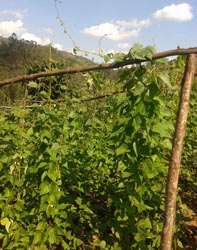 |
During the long rains season (March – July 2014), 5 demo plots were established in the Northern province of Rwanda in collaboration with N2Africa partner DRD and farmers’ associations and individual farmers as well, with the objective of promoting the best method of staking and the use of inoculants on climbing bean. Results have showed a good response to inoculants in all sites and on all varieties used. ...
Photo: Sisal strings method in Kinoni site
|
|
12 |
| Kenya Update: Now operating within Tier 1 |
|
In Kenya the five main objectives are 1) expanding awareness of BNF technologies, 2) dissemination of proven BNF and grain legume production technologies, 3) conduct training in BNF technologies, 4) design field demonstrations of N2Africa best practice that are conducted by others, and 5) backstop Kenya’s inoculant industry. Here is a brief description of our approach to each objective. ...
Photo: Performance of SC Squire at Ongai Farm, Vihiga
|
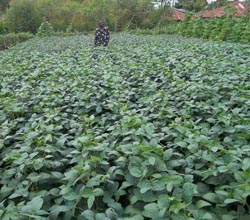 |
|
13 |
| Mozambique update |
Progress in partnerships:
N2Africa-Mozambique signed a Memorandum of Understanding (MoU) with The USAID AgriFUTURO (AgriFUTURO). This MoU facilitates an ...
Dissemination and training activities:
IITA’s N2Africa (N2Africa-Mozambique) finished with the harvesting of 2013-14 demo plots in Manica, Nampula, Tete and Zambézia provinces. In total of 87 plots ...
|
14 |
| Malawi, May – August 2014: Progress with implementation |
|
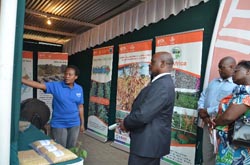
|
This article presents a series of workshops, conferences and other meetings that took place, collaboration that started or was intensified for progress with implementation.
Photo: Brenda Sopo of IITA takes the Malawi Minister of Agriculture, Allan Chiyembekeza (in Dark suit) through IITA activities
|
|
15 |
| Experts advise the Malawian government to give grain legumes a central role in the Farm Input Subsidy Program |
|
The Farm Input Subsidy Program (FISP) in Malawi has been a tremendous success in improving maize yields and reducing hunger in the country. The FISP is however plagued by inefficiencies in the implementation and the use of inputs and as a result, donor countries have been hesitant to contribute to the funding of the program in recent years. AGRA organised a technical meeting with agricultural experts in Salima, Malawi, on August 27-28 to derive recommendations for the Malawian government to improve the FISP.
|
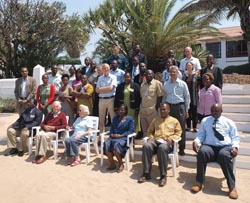 |
|
16 |
| Agricultural Shows and Nutrition workshops major activities during the off-season in Zimbabwe |
|
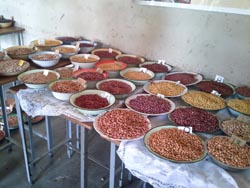
|
During the period June-September, N2Africa activities in Zimbabwe focused on local level value addition of grain legumes through nutrition workshops that involved mostly women farmers and dissemination of project technologies at both ward and district agricultural shows, which are annual events. These activities ...
Figure left. N2Africa beneficiaries were among some of the farmers who won at the ‘ward’ shows and subsequently brought their produce to the district agricultural shows during August
|
|
17 |
| Article published: Soybean rust: A major threat to soybean production in Tanzania |
Efforts of the government and development partners have stirred the interest of soybean production among farmers in Tanzania. The crop that is mainly cultivated for human consumption, utilization in animal feeds, soil fertility improvement and as source of income has increased in demand over the recent years. ...
|
18 |
| Maureen Waswa et al. article published: Identifying elite rhizobia for soybean (Glycine max) in Kenya |
Bio-prospecting was conducted in Kenya to identify elite isolates of rhizobia capable of effectively nodulating promising soybean varieties. One hundred isolates were recovered from nodules of wild and cultivated legume hosts. These isolates were authenticated and tested for effectiveness on soybean (Glycine max) var. SB 19 in sterile vermiculite, and the twenty-four most promising isolates screened in potted soil to assess their competitive abilities on two varieties ("promiscuously nodulating" SB 19 and specific SC Safari). ...
|
19 |
| Samuel Mutuma et al. article published: Smallholder farmers’ use and profitability of legume inoculants in western Kenya |
Research on the use of Rhizobia inoculants has been conducted in Africa since 1950s. However, the technology has not been widely applied by farmers on the continent. In Kenya, wide-scale adoption of this innovation among the smallholder farmers is still low. The aim of this study
The article is published in the Africa Crop Science Journal, Vol 22, No 3.
|
20 |
| MSc research in the Usambara Mountains, Tanzania: Thesis reports |
|
Last part of the series about the MSc research of Jori and Elise. The results of their field work and data analysis, is presented in two thesis reports that are available via the N2Africa website.
Photo: Elise (left) and Jori presenting their research outcomes. Photo credits Rik Schuiling
|

|
|
21 |
| Gender report available via the N2Africa website |
The gender report for Phase I, related to milestone 4.5.2. was published on our website on August 7th. It presents a lot of information on womens’ involvement in the N2Africa activities stated in numbers. You might already have opened it from our Facebook website, where it was shared on August 7th.
|
22 |

















